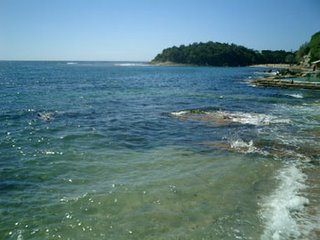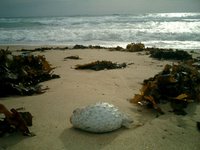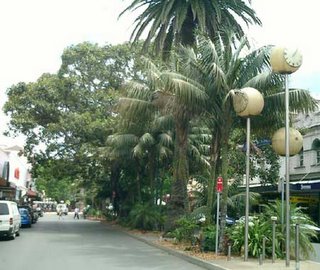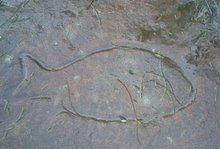 Manly CBD has now 21 new closed-circuit television cameras in strategic positions. This additional surveillance has the stated aim to prevent personal violence. Mnly is concerned that the sparsity of the technological eyes might not guarantee safety and the enforcement of the existing law. An area-wide coverage, at least 1 per 50 people (as in London) could ensure a civil society. Only ubiquitous coverage would have a chance of executing the law in 2006. There would be no more:
Manly CBD has now 21 new closed-circuit television cameras in strategic positions. This additional surveillance has the stated aim to prevent personal violence. Mnly is concerned that the sparsity of the technological eyes might not guarantee safety and the enforcement of the existing law. An area-wide coverage, at least 1 per 50 people (as in London) could ensure a civil society. Only ubiquitous coverage would have a chance of executing the law in 2006. There would be no more:Reckless speeding, illegal parking or emptying stinking bombs out
All you residents and visitors can participate in the emergent participatory panopticum. Grab the tools of transparency: cameraphone, wearable digital video recorder etc and take part in the 'sousveillance' from below. Moblog or vlog it. Become a witness and ensure that local government does enforce the law and guarantee the absence of violence. Send your witness accounts to Manly council to keep it a 'clean, safe and unique natural environment'.
Petrol spewing auto-mobiles on car-free zones
Smoking on beaches and smoke-free zones
Emptying of dogs on the beaches, promenade and national parks
Mauling of protected wildlife (penguins, bandicoots, possums etc)
Illegal (spear) fishing in the marine reserve
Butchering of nice old trees
Dumping of (fast-food) garbage all over the beach
Jet-skies and other motorised petrol crafts endangering swimmers and divers
Open fires at Shelley Beach and the National Park
Hummers with protruding metal spikes
Chucking toxic substances down the common drains
Wasting water (illegally) washing cars, cement etc.
30 December 2005
Watch over Manly
29 December 2005
Eels - Managing land or poisoning it
 A "gigantic aquaculture system" farming eels was managed by the Guditjmara community at Lake Condah for a long time. "In south-west Victoria people built intricate systems of stone canals and weirs, each covering several kilometres, to farm eels…" Wetlands were transformed into an eel-friendly landscape with weirs and channels. "… They modified more than 100 square kilometres of the landscape to breed eels. They constructed artificial ponds across the grassy wetlands and dug channels to connect them. And the whole scheme was systematically punctuated with eel traps." European farming destroyed this old aqua-culture and then the land. Eel husbandry and eel-trap-weaving skills have been passed on in the indigenous communities.
A "gigantic aquaculture system" farming eels was managed by the Guditjmara community at Lake Condah for a long time. "In south-west Victoria people built intricate systems of stone canals and weirs, each covering several kilometres, to farm eels…" Wetlands were transformed into an eel-friendly landscape with weirs and channels. "… They modified more than 100 square kilometres of the landscape to breed eels. They constructed artificial ponds across the grassy wetlands and dug channels to connect them. And the whole scheme was systematically punctuated with eel traps." European farming destroyed this old aqua-culture and then the land. Eel husbandry and eel-trap-weaving skills have been passed on in the indigenous communities.
In the Sydney region today eels are urbanised out of existence, via the destruction of wetlands and a generous application of toxins. Just recently eels were killed in the waterways of Dee Why. A neurotoxin, banned in many other countries, but commonly used in Australia to spray food!crops was used by 'person/s unknown'. The insecticide Endosulfan it was suggested, could be "horded" by any resident. Who knows if these rusty old bottles of POP are in your neighbour's garage/shed. Who cares when they apply illegal organochlorines, or just ordinary pesticides to the environment. Who knows, except when the immediate 'kill' surfaces before the public eye. Anyone can freely buy any quantity of pesticides and apply them as an untrained person. The synergetic effects are unknown in the neighbourhood, the food chain and our environment.
>
Lawns and pestides
Testing pesticides on human beings
26 December 2005
Sydney riots III, beaches & exclusionism
Ubiquitous Exclusionism in Australia
The recent violent riots in Sydney attracted international attention. Often the incident was treated as a racist aberration of one section of the Australian population against another. The fact that the progrom was just a spike in a continuous theatre of operation was understated.Only in 1992 did Australia come around recognising that the land grab of the Southern Land was not an 'empty land', but actually inhabited by indigenous Australians. Once settled, the White Australia policy sought "The total exclusion of undesirable alien races". The official policy, backed by all mainstream parties and the unions aimed at excluding non-white people from taking part.
While once the slogan was for an 'inclusive' "Australia for the Australians", the reality today is that more and more are excluded from the 'pie'. Radical redistribution and the trend to hog resources are ubiquitous in Australian society. Violence can be committed with a beer bottle, a pen, a keystroke or simply with a decision. Systemic violence does not have the 'sex-appeal' of a 'mob on rampage'. All participate in the system, but especially the 'haves' decide who is "one of us".
Recent research found that the Anglo-Saxon population in Sydney, living in the "wealthy areas in city's east and north, such as Woollahra and Mosman" are the most 'intolerant', holding 'extreme attitudes' about 'race'.
Sydney is held to be synonymous with an "…epidemic of consumerism, money-hunger and affluenza… In Sydney, more than any other part of Australia, a person's worth is measured by money. Money and what it can buy have become the great dividers, the symbols that mark out the winners from the losers." The 'invisible hand' excludes the losers and puts them 'in their place.'
The affluent act metropolitan in their exclusive Australian 'village atmosphere', wishing they could be in Tuscany, N.Y. or Zurich engaging in some more compulsive acquisitive behaviour.
Another report about Melbourne also states that the gap between the haves and have-nots has grown. "Financial comfort" is clinging to the metropolis and poverty is "increasingly suburbanised". "Howard's Battlers" dwell in low income sub-urbia and the suburbs are full of "mortgage stressors". The poorest struggle to survive in the "rust belt regions" with the "worst levels of youth unemployment."
The 'lock it up for the locals' is by no way confined to the well to do. Parochialism runs through most of the social strata and demography. Keeping out international tourism from 'our NSW beaches' so that a man can still drive his 4WD on it, kill a few sharks and empty the dogs. Friendly, myopic bullies abusing public national parks for racing, killing, etc.
On the well-to-do side there are numerous examples of excluding others from their beaches. ( For non-Australians it might be mentioned, that the beaches are the only true public spaces: 'Life's a beach' around here.)In 1998 Baywatch intended to film a few episodes at Avalon beach. The response was: "…It's our beach and how dare anyone who doesn't live around here get any benefit from it or interfere in any way with our enjoyment of it". The well to do WASPS stated a clear: NIMBY (Not In My Back Yard). Other Australians are excluded with 'building standards' and market prices, as the "boat is full".
Bondi beach managed to keep "Westies" (the non-affluent,from the hot inland suburbs) out by preventing public transport to the place being built. "The locals love living by an international icon. They just don't seem to like outsiders actually visiting the place."
With time and different constellations, 'the other' who is to be excluded, shifts. Tags like: 'dark', 'coloured', 'foreigners', other 'races', other religion, other cultures or other ethnicities change. The key is that a certain group holds and enlarges power and wealth, implicitly denying access to privatised resources for the 'others'. Once all owners, foreigners, tourists and willing business people are excluded, the fight starts inside the group to gain 'lion shares' and power. In the end they can just turn against each other on a 'dog eat dog' island.
The effects of such ubiquitous exclusionism are damaging to the whole country. The illusion of locking oneself up on a 'self-sufficient' island from the world is delusionary. The managed absence of a civil society encourages progroms to spike in greater quality and quantity and finally even towards the 'top'. The international reputation for a 'tourist country' should not be underestimated. The high economic and political costs of reserving it all for a few to use up quickly are enormous.
Riots I
Riots II
2005 Cronulla riots, Wikipedia
Update 0714
"This Sunday, every Aussie in the Shire get down to North Cronulla to support Leb and Wog bashing day” SBS Documentary
ABC Four Corners - Riot and Revenge video
Combating Racism, Reclaiming Patriotism, Dr Tim Soutphommasane speech, Race Discrimination Commissioner, 29.07.2015
16 December 2005
Extinction and a world full of poodles
 "Nearly three times as many endangered species are on the brink of extinction than have died out in the past 500 years…" (The Guardian) At the moment 800 species are 'on the edge' (map) if no action is taken.
"Nearly three times as many endangered species are on the brink of extinction than have died out in the past 500 years…" (The Guardian) At the moment 800 species are 'on the edge' (map) if no action is taken.
No problem, we are content with a mono-culture of poodles. X-mas is the time to support the pet industry, which has doubled in the last decade. Buy that new puppy, chuck that white fluffy thing (see local papers) or the pit bull and get an 'allergy-free' puggle. The latest 'must-have accessory', a designer dog, sure to fit into that cute hand bag. "It's like mixing a Versace bag and a Coach bag together" Further accessories for Barbie-doggie could be a mobile, his/her own radio programme, Satellite tracking, jewellery (Manly market), designer clothing or a doggie magazine. Designer x-mas presents for the dog/s. If there is uncertainty about a future, consult the dog horoscope.
There should be no more worries about getting your face chewed off or kiddies mauled. Yes it still will take petrol to empty the dog in the local park or at the beach.
15 December 2005
Automobile apartheid & sacrifice
In a world resembling a giant car-park with a mash-up of roads, personal freedom to mobility, especially of the young, the not so young, specific groups and any non automobile users is severely limited.
As David Roberts from Grist puts it:"Automobile apartheid means anyone who wants mobility through walking, cycling, or public transportation suffers discrimination in a built environment designed for automobiles."
"First-class citizens drive motor vehicles, second-class Americans walk, cycle, or ride public transit."
The human sacrifices of ancient civilisations are condemned, the human sacrifices to the auto-mobile 'god' becomes a mere risk calculation individually and systemically.The 'road toll' and 'road kill' fill the 2cm margins of the tabloids."In the past 25 years some 175,000 pedestrians have been killed on America's roadways." (grist)
Children and over 70's suffer the highest fatalities. Specific ethnic groups are also over represented in these stats.
- How is it possible that 10 cars roll over a woman on a highway and do not notice anything?
- What system can issue a $5 jaywalking ticket to a 73-old pedestrian that is bleeding on the ground after being hurled into the air by a car.
- What mind must one have to knock down an eight-year-old disabled girl with her walking frame and flee the scene?
Compulsive passive driving for all who need to breathe further reduces life quality and life expectancy for all.
previous:
Motorised transport and its regulation
4 WDs
13 December 2005
Sydney riots II
An update to 'Sydney riots':
- There is an Wikipedia '2005 Sydney race riots' about.
- The Sydney riots have now also entered Wikipedia's 'list of riots'.
- Politicians and law makers are ready to change the law 'to give police extra powers.'
- A Sydney cabbie, 'man of lettuce' gets around and has a lot of commentary and pictures.
- Technorati: 'Sydney riots' or 'Cronulla'
2005 Cronulla riots, Wikipedia
Fishy stuff
An 11-year study found that prohibiting fishing in the World Heritage Area of the Great Barrier Reef helped fish stocks to recover. (ABC news)
Populating the coast without adequate infrastructure leads to a cocktail of sewerage & salty lagoon. Dead fish and birds in Broadwater National Park are the result. (ABC news)
Dolphins used as bait. Wish these Aboriginal sea rangers would guard Sydney's marine environment too as all sorts of stuff goes as bait here: penguins…(ABC news)
"California banned commercial fishing of abalone in 1997 because of over-fishing and the molluscs are now imported from Australia and New Zealand." A meal costs around US $ 50 - 70 in the US. (ABC science news)
"Chemicals from products that we use in our homes every day are…" turning the Arctic into a 'chemical sink'. Whales are full of PCBs and pesticides.(ABC news)
Lawn obsession II
 Mnly reported on the lawn obsession in Australia. An article by Sarah Rich in World Changing recaps the situation for Los Angeles. Two references mentioned there, Archinects and CCA especially provides a very elaborate cultural history of the lawn in sub-urbia. A must-read! Also no shortages of good ideas how to turn these lawns into fruit.
Mnly reported on the lawn obsession in Australia. An article by Sarah Rich in World Changing recaps the situation for Los Angeles. Two references mentioned there, Archinects and CCA especially provides a very elaborate cultural history of the lawn in sub-urbia. A must-read! Also no shortages of good ideas how to turn these lawns into fruit.
"North America now has more than 32 million acres of lawn under cultivation, occupying more land than any single crop, including wheat, corn, or tobacco. Americans spend $750 million a year on grass seed alone and more than $25 billion on do-it-yourself lawn and garden care, making the lawn and landscape industry a booming sector of the economy." (CCA)
Image:'toxic uniformity'
12 December 2005
Sydney riots - defending the turf
"No man's land", Terra nullius was taken over by the British in a colonisation which included attempted genocide of the indigenous population and brutal massacres. In 1860 the turf had to be defended against Chinese miners by Caucasian miners, known as the 'Lambing Flat massacre'.
In boom times the turf wars just retreated to desirable spots such as beaches. (60's battles between surfies and westies.)
These days, civil unrest by youths has erupted in Sydney's southwest (Macquarie Fields) and Sydney's southern beach Cronulla. Not an isolated occurence as just this year the streets of Europe (France, Belgium, Denmark, Germany, Greece, Netherlands, Spain and Switzerland) went up in flames. Just the 'Paris riots' are said to run up to €200 Million.
Various social policies, but foremost youth unemployment, lack of perspective and integration have been made responsible for these phenomena. An ILO study claims that "Half the world's unemployed are under 24". Australia has had persistently high youth unemployment.
In the very recent riots, were 5000 Australians of 'Anglo-Saxon' appearance engaged in racist violence against Australians that had an 'Middle Eastern' appearance, '25 people had been injured and 16 arrested, about 40 cars were vandalised'. The case of 'yob vs yob' made the news internationally, tourist operators and residents are anxious.
A specific social milieu just 'liberates the party animal'. Scarcity of resources makes it appear that 'the other' is one too many in the queue. The next step is:
"Ethnic cleansing
the practice of forcibly removing (or even killing) a group of people from an area so that the people who remain all belong to the same group - so that, the area is 'ethnically pure'."
Quotes form the mainstream media:
"It was like Australia Day gone crazy…"
"Were all looking for a party."
"Never in my working life did I ever imagine a mob, a drunken mob, turning on a woman"
"…Tensions had been simmering within the primarily Anglo-Saxon community against people of Middle Eastern descent for some time."
"Defending the Aussie way of life"
A Kristallnacht?
Keywords:
Pride, party, celebrate
Chants used:
"string him up"
"Aussie, Aussie Aussie, Oi, Oi, Oi"
"Kill Lebs"
>>Riots 2009
Cronulla riots 2005, Wikipedea
11 December 2005
Manly Beach culture
At the beach parade hotted up cars and motorbikes revving up and down stinking the place out. The sound-scape they produce makes one wonder how people can sit along it in restaurants and cafes. But as long as they do, the business community will not pressure to regulate this motorised parade.
On the beach, beach volleyball in its commercialised form takes up considerable 'real estate', each net a mega stereo to blast on top of the surf.
On the sand one layer further down, more and more gear 'monetarising' the beach. Billboards increase, blocking the view.
At the water line the smell of petrol from 'life saver' vehicles and most of all their motor boats. Swimmers not only have to suck up all the petrol fumes but the behaviour of the boat makes it a matter of time before bodies get minced. Senseless racing up and down the surf with petrol powered motor boats means that one can not escape motor noises even IN the water.The boat was used to provide some beach beauty with a fast water skiing sensation, always close to swimmers.The sound of the surf is now a sensation of the past. There is truly no more 'getting away from it all'.
On the Corso, smoking in defiance everywhere, butts all over, just like on the beach. Forests of signs but no enforcement.
On the roads in between 'traffic' and oodles of billboards going around and around on cars and scooters. The latest cheap advertising is to squat (rows) of car parks, leave the vehicle with billboard there, or even cars for sale. A form of outsourcing business space onto free public space?
At dusk on the waters edge the fishing rods go up, knives, guts and hooks all over the sand. Digging for the last worms to save on bait. For walkers and joggers the 3-4 high tec rods per person are often a challenge.
Then the regulars at 6 pm walking their large dogs on the beach, looking the other way when the dogs empty themselves. But when there is no enforcement...
At night the fishing boats go about their business in the marine reserve with big spotlights. Who cares?
As the mantra goes: intensify, use it up quickly and move on...
Fairy Bower food quality
Tempted to try the Fairy Bower restaurant again - regrets. One fish was black, the other uncooked, all stacked on some generous slop. Quantity yeah, but what a love-less heap!
09 December 2005
Testing pesticides on human beings
Just another word about pesticides - it is known that such nerve poisons are tested on rats, but it is not so widely known that testing pesticides on humans is growing.
Human medical experimentation was attempted using children to measure the effect of pesticides. (WIRED)
According to a German TV station report (German), Bayer had a pesticide tested on over 18 year olds via a private clinic in Scotland.
Experimentation on human beings is cost effective for corporations and allows them to raise the threshold of their substances.
Under Bush, pressure exists to 'liberate' the 'protection for subjects in human research'. The 'protection' suggests "to ban intentional dosing human testing for pesticides when the subjects are pregnant women or children…" (EPA)
This study is telling about newborns and pesticides in a non experimental environment, called reality. (A benchmark investigation of industrial chemicals, pollutants and pesticides in umbilical cord blood, 2005)
Lawns and pesticides
Most sub-urban homes and public green spaces in Sydney consist of lawns. Petrol-powered equipment creates a noise nuisance (long abolished elsewhere) for most of the day. But apart from the internal combustion engines, the whippersnippers and leaf blowers it is the toxic lawn chemicals that are of serious concern.
Stan Cox reports about the situation in the U.S., but the scene in Australia is probably not much different:
"Profits from agricultural pesticides have been low for years," sending agrochemical manufacturers in search of new markets. Today, "their most reliable customers" are the makers of lawn-care products, who, in turn, are working to "increase the ranks of chemical-using lawn managers."
"…50 percent of households treat their lawns or gardens with pesticides, applying active ingredients at average annual rates of 2 pounds per acre for herbicides and 0.4 pounds for insecticides. Professional applicators apply an average 193 pounds of fertilizer per acre per year, while do-it-yourself homeowners use 139 pounds."
Beyond Pesticide quantifies the problem in the following way:
"Annually, over 100 million pounds of pesticides are used in and around homes and gardens. Alarmingly, suburban lawns and gardens receive far heavier pesticide applications per acre than most other land areas in the U.S., including agricultural areas."
The health effects of these cocktails on humans:
"Such widespread use and exposure is alarming considering that of 30 commonly used lawn pesticides, 13 are probable or possible carcinogens, 14 are linked with birth defects, 18 with reproductive effects, 20 with liver or kidney damage, 18 with neurotoxicity, and 28 are sensitizers and/or irritants." (See also their pdf for more details)
Why have a monoculture of lawns?
Cox cites a study that suggests that "property values are clearly associated with high-input green-lawn maintenance and use," and that "moreover, lawn-chemical users typically associated moral character and social responsibility with the condition of the lawn."
Apart form the 'tidy town' symptom it is also a stated part of Oz DIY culture and of course a good way to 'kill time.' The lawn care industry has an interest to substitute labour with petrol and chemicals to roll out that 'instant turf'.
What are the alternatives?
Cox cites that "Any truly sustainable alternative is, put simply, bad for business." For gardeners conversion to organic lawn management is desirable. No noise, petrol fumes & artificial toxic sustance dependence and dangers to health.
Better still would be to rip out the lawn and create a low water, low maintenance native garden. It will take some time, but you will be able to spend your time productively, lessen the environmental burden and encourage wildlife to your dwelling.
Links:
DB of common names of pesticides
NSW EPA, compulsory training info for people who work with pesticides.
Pesticide gardening info,UK, esp. the stuff most gardeners use.
Signs and Symptoms of pesticide poisoning
Effects of organophosphate poisoning
Using native grasses in your sustainable garden
Make an 'edible estate'
Picture: Defend your Turf!
Beyond Pesticide resources
Previous article in Mnly on the topic:
On petrol gardening
08 December 2005
Melting ice and climate change
 In the North Atlantic, the melting of the Arctic ice cap will result in a general cooling in Western Europe. The melting ice inhibits the ocean current - the Gulf Stream - which takes warm water into the area. The lighter, cold, fresh water from Greenland forces the warmer, heavier salt water to sink and cools the surrounding land.
In the North Atlantic, the melting of the Arctic ice cap will result in a general cooling in Western Europe. The melting ice inhibits the ocean current - the Gulf Stream - which takes warm water into the area. The lighter, cold, fresh water from Greenland forces the warmer, heavier salt water to sink and cools the surrounding land.
In Eastern Australia global warming will bring climate change related to the melting of Antarctic ice. The melted ice will impact on the Antarctic Circumpolar Current. This current is responsible for the "redistribution of heat", the absorption of greenhouse gases and oxygen, as well as the renewal of the ocean including life-supporting oxygen.
Research is being carried out at CSIRO into the implications of climate change for those bordering on the Southern Ocean. An impact analogous to that happening at the North Pole can be expected as cold, light-weight fresh water replaces the surface salt-water being moved by the Antarctic currents.
"Understanding global circulation and the conditions under which surface waters sink into the deep ocean is critical for scientists estimating the timing and magnitude of climate change."
Kyoto - or the big Australian party
 Australian greenhouse gases output is rising. Both the US and Australia are the two post-industrialised nations that are too poor and also unwilling to contribute to the Kyoto Protocol and reduce carbon-based gases. The effects on the Earth and human health are available via WHO. Will it get hot!
Australian greenhouse gases output is rising. Both the US and Australia are the two post-industrialised nations that are too poor and also unwilling to contribute to the Kyoto Protocol and reduce carbon-based gases. The effects on the Earth and human health are available via WHO. Will it get hot!
Over the last few days in Sydney everyone could feel how these gases "…act like an invisible blanket, trapping the Sun's heat and driving up the planet's surface temperature." The reaction of Australia's 'booming population' is to rev up the air-conditioners in mostly un-insulated houses. This jolly use of electricity has been discussed before here and here. It is also a cultural convention for car/hummer drivers to mount their vehicle, switch it on and then go about arranging things, before after 20 minutes or so revving off. Long conversations with someone outside the car can only be had with the motor running. Go check in your hood & workplace for this odd behaviour. Lets not talk about the state of these automobiles or transport here.
Seems politicians here do not have a mandate to change anything in regard to greenhouse gases. What the heck!, let's sacrifice the future (generations)!
Links:
ABC News Online
more ABC news
The Australian
07 December 2005
06 December 2005
Participating in maintaining Manly's landscape - ideas
The land-scape of Manly is undergoing radical and fast changes brought about by the human species, specifically in the last 200 years. For many the rate of progress/ion goes unnoticed or they are yearning for acceleration. The expansion of mono-culture over all other species and their habitat can be examined, recorded and action for a sustainable landscape (ecology) can be realised.
At the University of Vermont geologists explore this link between human action and landscape change in an interdisciplinary Landscape Change Program. Photos of the landscape are collected from regional web-based archives and individuals. The free online digital archive of the historic and current photos serves for research and educational purposes. The interactive nature allows all participants to submit images, group them into "before and after" sequences. Additionally 'smart maps' (GIS) tag the exact locations of the images. Open access to the resource makes it dynamic and sustainable.
For Manly (Sydney) this form of free access to the creation and distribution of cultural and natural heritage could be utilised by various interest groups such as environmental action groups, historical societies, ecological surveys and education.
Maybe soon...some organisation...
The Landscape Change Program
Landscape Ecology
Manly images
05 December 2005
Ocean Care
 Went to Ocean Care a "family fun" event to "celebrate Manly's unique marine environment." Many participants sought to inform, entertain and sell that unique habitat. Never have I seen so many Ocean Cars. Packed 2 kms of family hummers parked from one end of the beach to the other.
Went to Ocean Care a "family fun" event to "celebrate Manly's unique marine environment." Many participants sought to inform, entertain and sell that unique habitat. Never have I seen so many Ocean Cars. Packed 2 kms of family hummers parked from one end of the beach to the other.
Came away with an arm-full of pulped trees. Interaction confirmed, that aquatic or terrestial enforcement of law protecting native flora and fauna ends at 4pm. Cats & dogs enjoy full, enforced rights 24/7 with the backing of a huge industry.
Pity, the many groups are not aggregating as an interactive online network providing the possibility for virtual participation all year round.
The discovery was Martin Cullen's art works highlighting Manly's current developments, but at the same time, being timeless and standing for 'progress' as such. Nice pics! Mnly blog shares this sentiment.
01 December 2005
Illuminating x-mas lighting
 At the moment Sydney is falling into the pre x-mas electric lighting hysteria. Individual households are illuminating the outside of their properties in a competitive arms race blowing (wattage) energy 24/7. Public organisations join the frenzy, despite their commitment to 'green obligations'. A drop-dead (bird) lighting of trees heats up the event-hype.The occasion is apparently for 'the little ones' to demonstrate to them how to go about energy efficiency and sustainable (New) Years. All effects on the climate (and their future) are forgotten in the glowing frenzy of Las Vegas flickr. If the subs have to be electrically illuminated, then at least it could glow efficiently using LED. But for a true 'silent night' the dark sky with its mega-show could be an efficient attention-zapper that is sustainable.
At the moment Sydney is falling into the pre x-mas electric lighting hysteria. Individual households are illuminating the outside of their properties in a competitive arms race blowing (wattage) energy 24/7. Public organisations join the frenzy, despite their commitment to 'green obligations'. A drop-dead (bird) lighting of trees heats up the event-hype.The occasion is apparently for 'the little ones' to demonstrate to them how to go about energy efficiency and sustainable (New) Years. All effects on the climate (and their future) are forgotten in the glowing frenzy of Las Vegas flickr. If the subs have to be electrically illuminated, then at least it could glow efficiently using LED. But for a true 'silent night' the dark sky with its mega-show could be an efficient attention-zapper that is sustainable.
Links:
A 'must-have' killer x-mas light display
Extreme lighting video and pictures
On LED xmas lights
Update: 06.12.05 X-mas DIY with LEDs
19.12.05 Ugly christmas lights collection
A commerce- friendly Corso for Manly?
 The Corso, Manly’s gateway from the ferry to the beach is to be radically altered by The Manly Chamber of Commerce and Manly Council. The other stakeholders were asked to comment on the changes by 24th November 2005. Details here.
The Corso, Manly’s gateway from the ferry to the beach is to be radically altered by The Manly Chamber of Commerce and Manly Council. The other stakeholders were asked to comment on the changes by 24th November 2005. Details here.
- Privatising and commercialising public space has negative impacts on residents, tourists and consumers.
- The reduction/elimination of native flora or old trees would be a loss of value to all species, but particular to the image (branding) of Manly.
- The facilitation of motorised traffic is a health hazard.
Oil, war, death & cars
Oil, war & profitability: 10 % of the proven oil reserves are owned by Iraq. After the Iraq War mainly Anglo TNCs are seeking to get 'agreements' to appropriate the 115 billion barrels of oil to return a profit margin of 160 %. Detail in this (pdf) report.
Cars are 400 x more lethal than terrorism: "Deaths from car crashes in developed countries are nearly 400 times greater than those resulting from international terrorism…"
"As many people die every 26 days on U.S. roads as were killed in the September 11, 2001, attacks, and politicians should bear this in mind when allocating resources to combat two "avoidable" causes of death, researchers said." (Reuters)
Anti-product cars: Observe these nice images of how (US) consumer society dumps their cars into the landscape. Nice pics here too of unwanted hummers.










